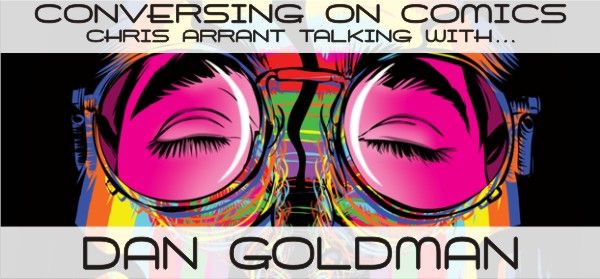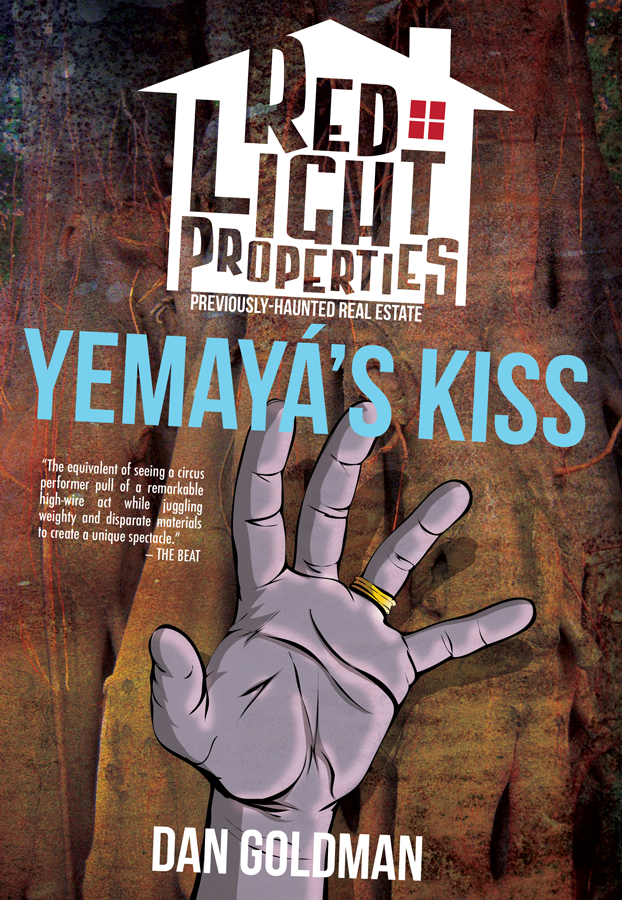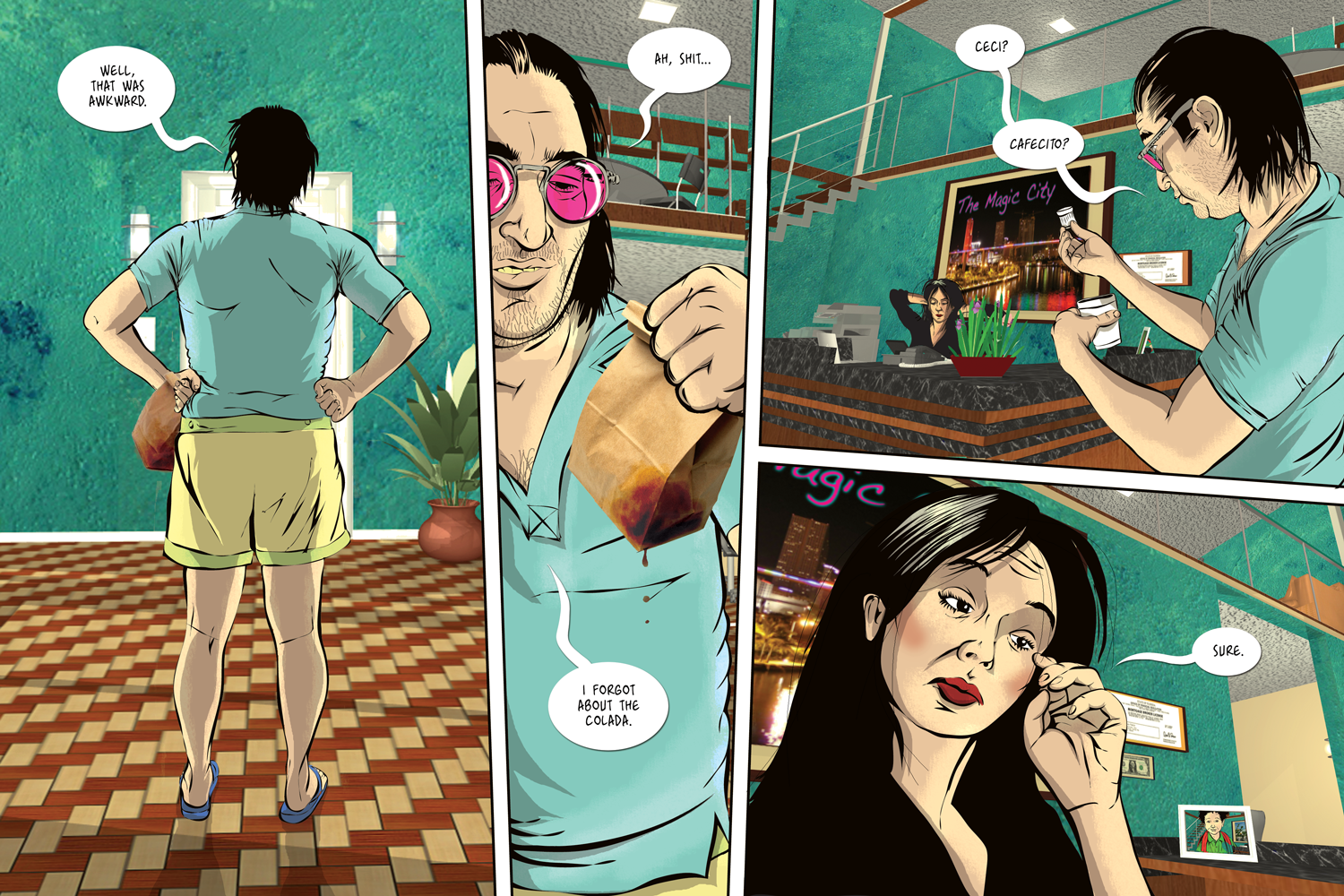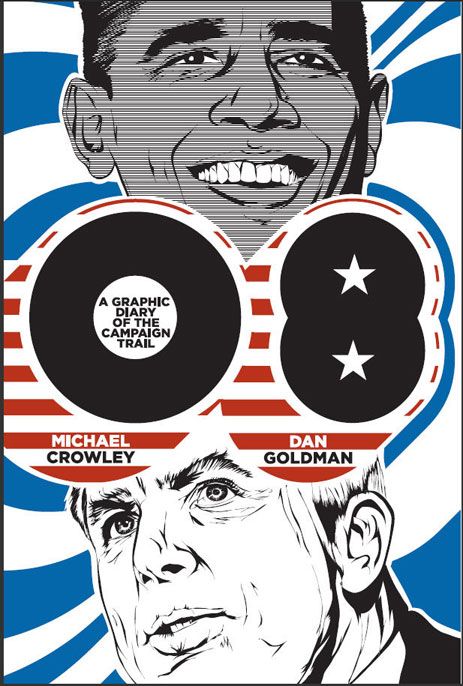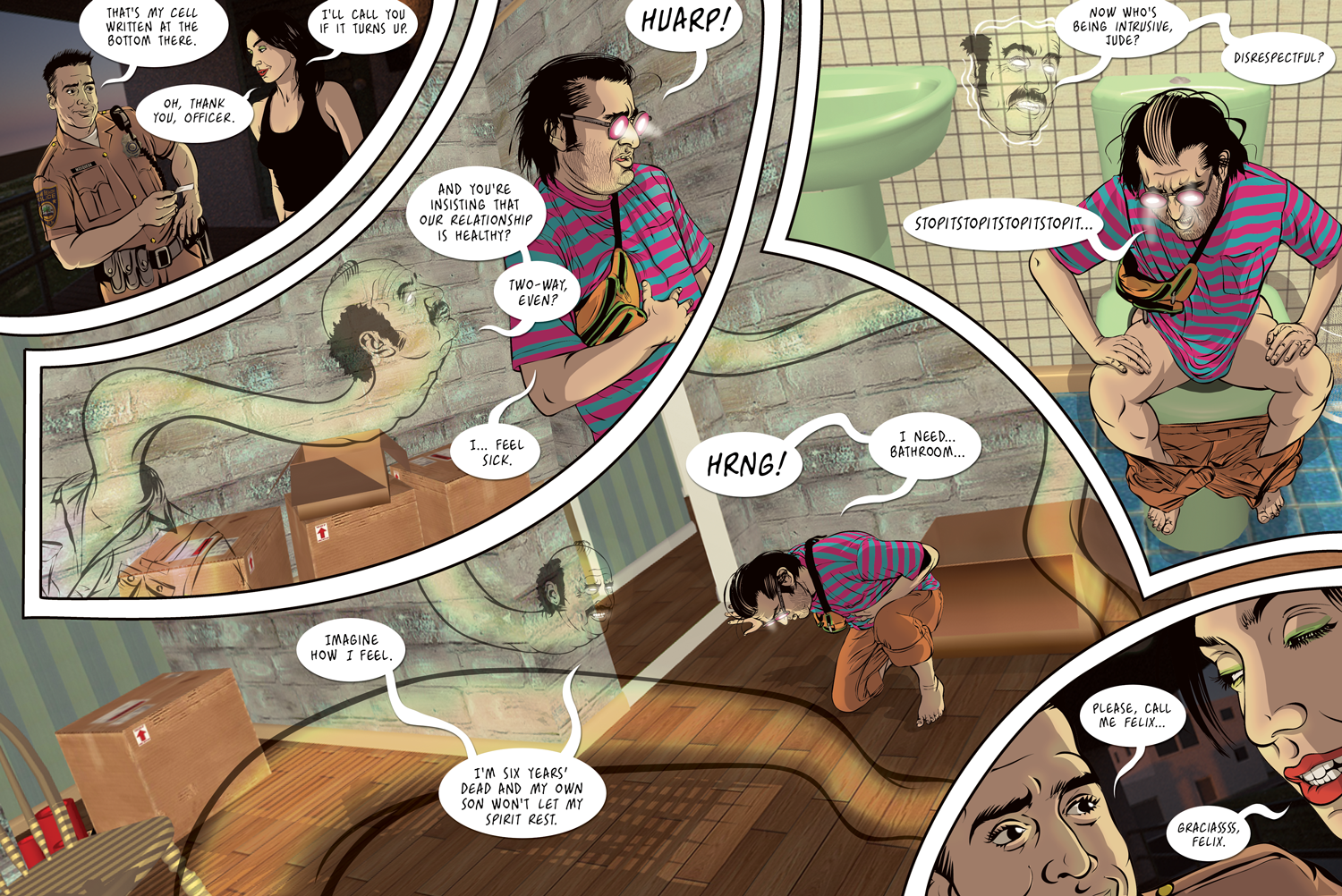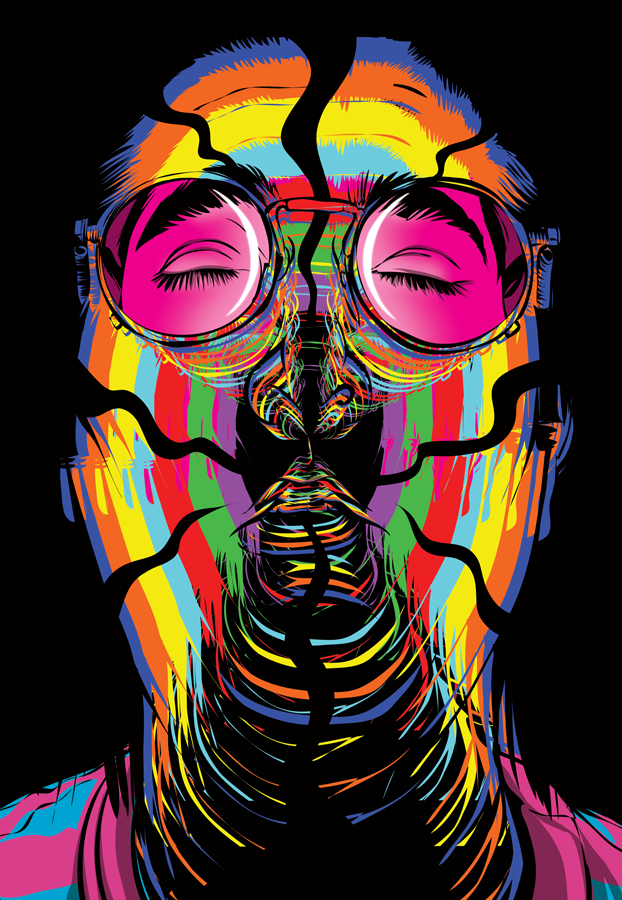Location, location, location. It's said those are the three important things when it comes to real estate, and cartoonist Dan Goldman knows that more than just about anyone.
Born in Detroit, raised in Miami and coming of age in New York City, Goldman spent the past few years living in São Paulo, Brazil, before returning late last year to New York. A longtime proponent of digital comics, he was among the founders of Act-I-Vate, and launched his current comic series Red Light Properties in 2010 on the website of book publisher Tor. But recently Goldman decided to hitch his boxcar to a different train when he jumped to upstart digital publisher Monkeybrain Comics to continue his 300-plus page run on that title.
Red Light Properties is all about location (location, location), but in a supernatural sense, as it follows a Miami real estate agency whose specialty is to survey, repair and re-sell distressed homes. But these aren't your normal condos; they're possessed by the ghosts of dead former tenants. Jude Tobin, the man behind RLP, is a clairvoyant whose powers only come to life when he's "under the influence," so to speak, and his associated family and busniess partner have to deal with his problems while also handling their own. It's as if William S. Burroughs wrote Ghost Whisperer, but you know, with even more hallucenigenics.
I reached out to Goldman to find out more about this new era for Red Light Properties, but also to get his perspective on being an American cartoonist living with Brazil, and the story that took him there and brought him back.
ROBOT 6: What are you working on today?
Dan Goldman: This morning I'm spending my "office hours" working on the script to an autobiographical comic novella I'm creating for The Atavist, then I'll switch gears later in the day to banging my next issue of Red Light Properties ("After Hours") into shape for those nice people at Monkeybrain Comics.
I’ve interviewed you several times over the years, talking about everything from Everyman to Styx Taxi and over to Shooting War, Red Light Properties. I reached out to you for this partly to welcome you back to the States after living in Brazil for about three years. What brought you back, and back to New York?
Thanks, man ... it's great to be back home again. "Home" has always been a slippery concept to me at best. I never really felt like I belonged anywhere (growing up in South Florida, life in New York was the closest I'd come). After living in São Paulo for the last three years, it finally clicked that "home" was the place I'd just left behind, the one that hung onto my bones while I sat on the other side of the world. Cue sad trombone: I didn't know I was a do-or-die New Yorker until I left the city for good.
What brought me back was just that: the feeling of "this is where I fit" that I never felt in São Paulo, not even for 10 minutes. Living down there, I was always a foreigner, a gringo, a gaijin to everyone I met, cultural gaps keeping me from communicating ideas and thoughts even though I'd learned the language. It's a lonely thing to be an American abroad, and it's something I've written about extensively while living in Brazil, the day-to-day experience of living abroad and the tiny adjustments you make to get through daily life.
That time away, was it work-related, personal or something more holistic?
All of the above, definitely. After finishing 08, I was pretty sure I didn't want to any more "topical" work that nobody cares about six weeks after it's released. Ultimately, the political work just feeds into a simplistic media narrative that I don't want to be a part of in any way. I wanted to do more personal work about more universal human issues. In order to get into that headspace, it made sense to fuck off somewhere different, strip away all distractions and see what came out of me.
I'd also wanted to live outside the USA for a long time but I never stopped working long enough to do it. My wife's Brazilian with a big sweet family, so that was an easy jump. Our plan wasn't even to stay in Brazil, just to warm our tootsies in the sun for a few months while we submitted paperwork for Canadian residence from there (it's faster than submitting from the USA). But I was digging the grungy-funky chaos of urban Brazil and working like a madman on Red Light Properties for Tor.com, and before we knew it, a year had passed and we hadn't yet submitted our Canadian paperwork. There was definitely a romance to the idea of living in Brazil, even if it's a 2-D postcard romance.
Living there gave me a different perspective o n… everything: mortality, family, being a man, an artist, an American, etc. Travel definitely lets you see yourself from the outside, but actually living overseas is a whole other level of that. I spoke next to no Portuguese when I arrived, so my first year was just me trying to figure out what was going on around me in the most basic survival sense. That cuts you off from everything right away, when you can't pull off a friendly kibbitz with the guy squeezing your fruit juice or the cab driver ... and you lose those little moments of community that connect you to the world around you.
The benefit of that vacuum was having the empty space upstairs to fill with all kinds of new work: I was prolific as hell in Brazil. I drew 300 pages on Red Light Properties, did some TV development, got my first gig writing a videogame, started my first novel and wrote a ton of new comics work no one's seen yet. And that experience of letting go of yourself in a new land where you can't totally communicate was perfect for clawing around in my own guts for new things to spin into stories.
Comics are made now over the tubes of the Internet, but did living so far out of the American comics space make things more difficult in terms of getting those deals, meeting those people, and rubbing elbows at those conventions?
I definitely believe in that Internet magic making face time less important than it used to be, but being so far away did make me feel out of sight, out of mind. Of course, when I flew in for New York Comic Con in 2011, it really was like I'd never even left.
During your time away, for American readers, you were a bit off the radar. Your last print book was January 2009’s 08: A Graphic Diary of the Campaign Trail, and your Red Light Properties webcomic, then at Tor.com, was outside the avenues of where the traditional comics reader normally travels. As a comics professional, what was it like seeing comics from a different geographic vantage point?
The U.S. economy tanked nearly the moment we arrived in Brazil, and e-readers and tablets storming the gates as the dust settled. All that tension trickled down into comics, which I felt by 2010-11's "buying freeze" in the graphic novel market. Suddenly I felt very separated from the whole comics community, just watching it all go on without me … from webcomics to comiXology to Madefire.
It was also frustrating, as I never stopped created new work: I was posting Red Light Properties weekly (even daily for much of 2011) that for whatever reason didn't seem to be reaching people. I'd cultivated a group of awesome fans during the run on Tor.com who followed me along as Red Light Properties has moved from place to place, but it never seemed to register with wider comics culture until now.
On top of that, in Brazil "digital comics" means webcomics … and webcomics are considered a playground for amateurs. Printed books are the only thing that carry any respectability, and I've got editions of my books in English, French, Italian, Spanish but nothing in Portuguese. So when I'd meet other Brazilian cartoonists, they'd pat me on the back and tell me to "keep trying and you'll make it." I kept explaining to them that in the rest of the world, print sales are sagging and everyone's rushing towards digital distribution, and they'll smile and romanticize paper books like people used to a few years ago.
One in three Americans owns a tablet of some kind, while Brazil just got the black-and-white Kindle in November. The Brazilian print market is booming because their new middle class (different from their old middle class) is just discovering the joy of reading, so things are still behind the curve a few years down there.
So how would you describe the Brazilian comic book scene for a reader?
American readers haven't even seen the best Brazilian creators, but I am sure they will soon. There are a load of talented people across the country doing fantastic and original work. Unfortunately, I think it's much harder for Brazilian cartoonists to make a living working for Brazilian publishers. Most of the comics published there are licensed from US and UK instead of funded and produced in Brazil. Part of this is that unfortunately, Brazilian culture values things with international success more than homegrown talent. Cartoonists who've come up in Brazil and gone on to succeed internationally like Bá and Moon and Grampá and Albuquerque and Guedes are like gods down there ... while other talents who've had success at home but not yet abroad royalty... yet.
But the level of talent there is so high that it's inevitable. I can't wait for international readers to discover work by Rafael Coutinho, Carlos Ferreira, Fabio Lyra, Rodrigo Rosa, Marcelo Braga … there's a whole world down there American readers have yet to experience.
The readership for comics down there is larger than the States, but it's dwarfed by the audience for manga and anime. By far, it's the most people "style", with manga schools in every neighborhood and manga drawing kits available at every newsstand.
Late 2012, and now 2013, seems to be a year of you pushing back into the crowd of American comics – first off, bringing Red Light Properties to the digital publisher Monkeybrain. What led you to shifting it over to them?
I'd been publishing Red Light Properties in a variety of different spaces myself and not really connecting with an audience I knew was out there. Monkeybrain launched immediately to a huge fanfare, clearly better than I was at the thing I was struggling with. I pinged Chris [Roberson] and Allison [Baker], and they were really enthusiastic about me coming on board. The more we talk and the longer I'm working with them, I'm proud to be part of something that feels new and important in the comics landscape.
Although you’ve been publishing this series online for years via Tor.com and your own site, I’d wager some people are just hearing about it now for the first time. Now with 300-plus pages under your belt, how do you view the series?
Man, I feel like I'm just hitting my stride with Red Light Properties after 300 pages. My most recent short "A Series of Tubes" hit the notes I'd been reaching for this whole time, so while I'm busy remastering the earlier part of the story (the whole look of Red Light Properties really leveled up over the last three years), I'm itching to get into the next phase of the series already.
I've set up Jude's drug-boosted clairvoyant abilities and their devastating effect on his marriage and family, how Jude's held his dead father's spirit captive for years, the Tobins' struggle to keep Red Light Properties afloat and the deal they've struck with the Jentas to keep listings coming in. We've opened the door on the mystery of Zoya's abilities, touched on Jude's past in SFAP (South Florida Association of Phenomenologists), introduced Jude's mentor in santería Kako and Jude's hallucinogen-dealer Dr. Amanda and his old colleague Rory Partch. More recently, I've given Cecilia a hunky cop to crash her broken heart into and revealed little Turi's own developing psychic abilities.
So from here … we let all these balls roll downhill for awhile until everything changes for everyone. I've been planning this series out for years, and watching them tulips start to bloom is a fantastic thing. My only regret is that I don't have seven clones to get us all there faster.
Red Light Properties is distinctly set in Miami – not just as window dressing, but really getting into the culture and unique vibe of the place. How important was that for you to get across and keep at the forefront of the book?
Miami's pretty key to Red Light Properties; it's as much a character as Gotham City is in Batman. The work Red Light Properties is doing … it starts to change the city. It's happening off-panel now, but there's lots of this bigger-picture stuff to come, and it's happening to the whole city. To show just the "rollerblades-and-models" South Beach version of the city like they do on TV would just clip the balls off where the whole series is going.
Wasn’t your mother a Miami-area real estate agent for years? Can you tell us about that informing this series?
Yep, she was a realtor in South Florida during the '80s and '90s. She used to drive me around town, explaining what was going on behind the scenes and fill my head with crazy stories that apparently sat around for 20 years waiting for a chance to escape. I didn't realize that until I started writing the series back in 2001, how much material was there.
The main character in this, the real estate psychic Jude Tobin bears more than a little resemblance to you, especially when you put your self-portraits side by side with your drawings of him. Is he a cipher for you, somewhat?
Really, they're all slices of me, regardless of the models I'm using for them. That model for Jude, though … we work together so often because the guy's always available to come to my studio whenever I need him.
Red Light Properties has almost silently crept up to being your biggest work yet, charting in at over 300 pages now. I know it was conceived as a digital-first project, but do you see coming out with a print edition at some point?
Yes, definitely. I'm sitting on contracts now, and the publisher for the series is going to be announced in a few weeks.
You've long been drawn to doing comics in a political vein, from Everyman to Shooting War to '08 and then that great short you did of Obama after he was president. What pulls you down that road?
Some kind of sickness, probably. I always believed comics are a powerful artform you can be use to make change in the world. That's where Everyman and Shooting War sprang from: a desire to shake things up. '08 was more of a narrative/design experiment, but all three came out hailed as "topical" and were quickly mis-shelved in bookstores and faded from print.
I'm not sure I want to walk down that road again anytime soon. It's really not where I'm at anymore.
So where would you say you’re “at” now? And would you ever consider returning to political subjects on your own terms?
It's foolish to say "never" but it would have to be something really special… Also: it's boring as shit to draw hundreds of pages of old white men in suits. I'm more interesting in telling stories for everyone, not just the cross-section of comic readers and political wonks.
The work I'm doing now — Red Light Properties and all the unseen new stuff — is where I'm "at" … as it should always be. I need to create art that contains pieces of myself, and lets me address love and death and our little blip in the larger universe. Writing your own work helps keep that happening.

